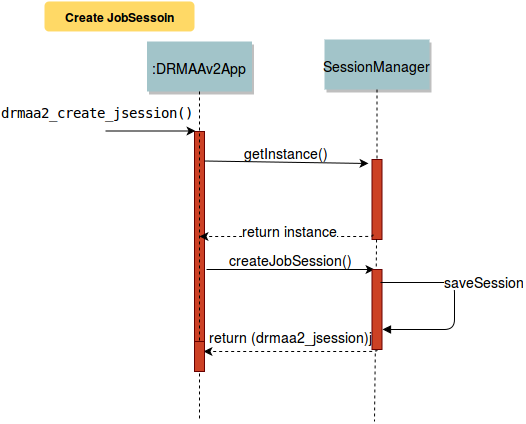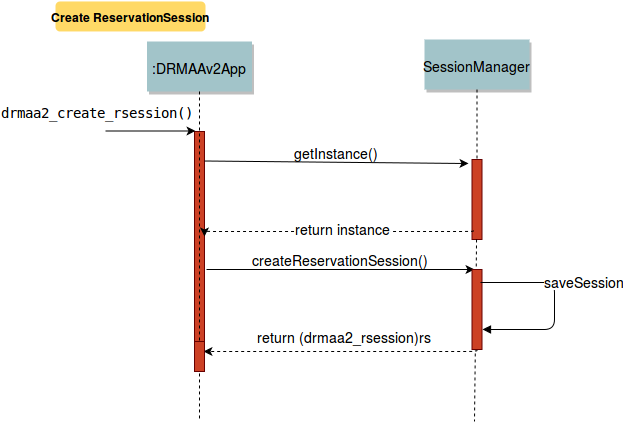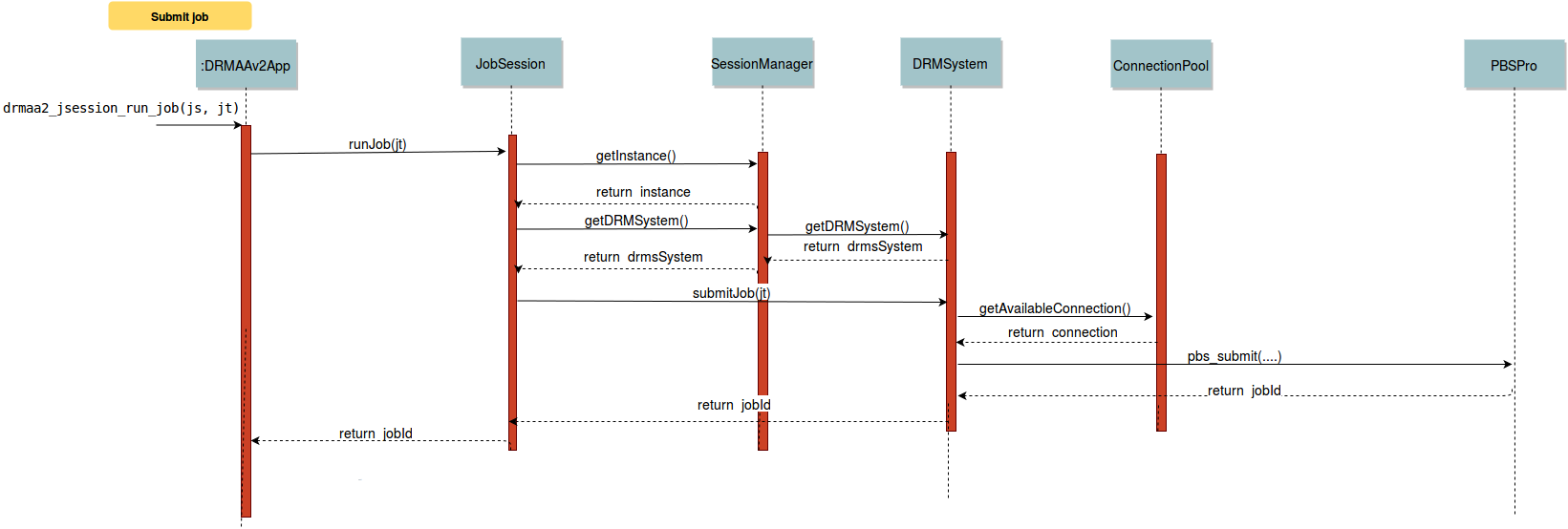Goals
Implementation of DRMAAv2 Specification
Background and strategic fit
The Distributed Resource Management Application API Version 2 (DRMAA) specification defines an interface for tightly coupled, but still portable access to the majority of DRM systems. PBS is Distributed Resource Management system(DRMS). Standardized access to PBS product through a DRMAAv2 implementation(API). High-level API designers, meta-scheduler architects and end users can rely on DRMAAv2 implementations for a unified access to execution resources.
DRMAAv2 Specification (Distributed Resource Management Application API 2)
Overview
As we all know open standards are taking major role in the exponential growth in many areas. DRMAA2 is such an open standard. It is the successor of the wide-spread DRMAA. DRMAA is generally used for submitting jobs (or creating job work-flows) into a compute cluster by using a cluster resource management system like PBS Professional. Unlike DRMAA with DRMAA2 you can not only submit jobs, you can also get cluster related information, like getting host names, types and status information or insight about queues configured in the resource management system. You can also monitor jobs not submitted within the application. Overall it covers many more use cases than the old DRMAA standard.
More details of DRMAA2 specification can be found from the following document.
https://www.ogf.org/documents/GFD.231.pdf
Assumptions
Requirements
The implementation of DRMAA2 specification for PBS Pro is broadly divided into the following requirements/user stories.
| # | User Story | Importance | Notes |
|---|---|---|---|
| 1 | PP-628 - Getting issue details... STATUS | ||
| 2 | PP-634 - Getting issue details... STATUS | ||
| 3 | PP-631 - Getting issue details... STATUS | ||
| 4 | PP-630 - Getting issue details... STATUS | ||
| 5 | PP-629 - Getting issue details... STATUS | ||
| 6 | PP-632 - Getting issue details... STATUS | ||
| 7 | PP-633 - Getting issue details... STATUS | ||
| 8 | PP-643 - Getting issue details... STATUS | ||
| 9 | PP-626 - Getting issue details... STATUS | ||
| 10 | PP-644 - Getting issue details... STATUS | ||
| 11 | PP-636 - Getting issue details... STATUS |
Architecture and design
Application stack
DRMAA2 Layout
Domain model diagram
ConnectionPool is set active connection with PBSPro. In multi-threaded application each thread uses one connection. ConnectionPool Is Member of DRMSystem
Overview of Object mapping
DRMAA2 spec relies on concept of session to support the persistency of job and reservation information in multiple runs of short lived applications.
The SessionManager interface is the main interface of a DRMAA implementation for establishing communication with the DRMS. By the help of this interface, sessions for job management, monitoring, and/or reservation management can be maintained.
- JobSession allows us to submit, control and monitor jobs. As opposed to MonitoringSession this allows us to control and monitor only those jobs submitted with in this job session only.
- MonitoringSession allows us to get on-line status of jobs submitted with in DRMAA2 JobSession/s as well as those submitted outside of DRMAA2 as well. Within a monitoring session we can't submit or control jobs. Due to this reason we can say that DRMAA2 is good to write Job Monitoring GUIs.
- ReservationSession allows us to submit, control and monitor standing or advanced reservations.
Refer DRMAAv2 document for description of Objects
Sequence diagram
Source Directory structure in github
├── ...
├── pbspro│ ├── src
│ ├──├──lib
│ ├──├──├──Libdrmaa2 DRMAAv2 module Top level directory
│ ├──├──├──├──libdrmaa2 All the function prototypes and definitions included in this API. Autoconf and libtool specification to create library.
│ ├──├──├──├──├──-- drmaa2.cpp API definitions
│ ├──├──├──├──├── -- drmaa2.hAPI and declaration
│ ├──├──├──├──src Core infrastructure sourcefiles
│ ├── ├── ├── ├── inc Core infrastructure internal include files
unittesting
│ ├──├──├──├──White-box testing
│ ├──├──├──├──├──src Source forunit-testing
│ ├──├──├──├──├── inc Internal include files forunit-testing
│ ├──
│ ├──
│ -- Doxygen.in Doxygen configure file
│ --
Directory structure in target
├── ...
├── $(PBS_EXEC)│ ├── lib│ ├──├──libdrmaav2.so
│ ├──include
│ ├──├──drmaav2.h
Dependent packages
cppunit, doxygen, PBSPro,
Compiling DRMAA2 applications for PBS Pro
It is assumed that libdrmaa2.so or libdrmaa2.a is installed as follows prior to compiling a DRMAA2 application.
rpm --install <rpm for libdrmaav2 for PBS Pro>
Example: rpm --install libdrmaav2_pbspro-1.0-17.x86_64.rpm
By default this will install the library to /usr/lib/libdrmaa2.*(so or a) and the headers are installed at /usr/include/drmaa2.
Now DRMAA2 application can be compiled as follows.
gcc -I/usr/include/drmaa2 -L/usr/lib/libdrmaa2.so <drmaa2_app> -ldrmaa2
We also need to set the following before starting the application if in case we are using shared library.
export LD_LIBRARY_PATH=/usr/lib/libdrmaa2.so ./<drmaa2_app>
Sample Example
drmaa2_jsession js; /* Job session object*/
drmaa2_jtemplate jt; /* Job session template*/
drmaa2_j j; /* Job object*/
...
...
...
/* Create and open job session */
js = drmaa2_create_jsession("testsession", DRMAA2_UNSET_STRING);
if (js == NULL) {
...
return;
}
...
...
...
/* Create job template */
jt = drmaa2_jtemplate_create();
jt->remoteCommand = strdup("/bin/date");
j = drmaa2_jsession_run_job(js, jt);
...
...
drmaa2_j_wait_terminated(j, DRMAA2_INFINITE_TIME);
drmaa2_jtemplate_free(&jt);
drmaa2_destroy_jsession("testsession");
...
...
...
drmaa2_j_free(&j);
drmaa2_jsession_free(&js);
...
...
...
...
...
...
drmaa2_jtemplate jt = drmaa2_jtemplate_create(); /* job template object */
drmaa2_rtemplate rt = drmaa2_rtemplate_create(); /* reservation template object */
drmaa2_string_list cl = drmaa2_list_create(DRMAA2_STRINGLIST, NULL); / *create list of strings */
drmaa2_dict env = drmaa2_dict_create(NULL); /* create a dictionary */
drmaa2_jsession js = drmaa2_create_jsession("myjsession", NULL); /* open sessions to DRM system */
if (js == NULL) {
...
...
return;
}
drmaa2_rsession rs = drmaa2_create_rsession("myrsession", NULL); /* create a reservation session */
if (rs == NULL)
{
...
...
return;
}
drmaa2_msession ms = drmaa2_open_msession(NULL); /*create and open monitoring session */
ml = drmaa2_msession_get_all_machines(ms, DRMAA2_UNSET_LIST); /* determine name of first machine */
if (drmaa2_list_size(ml) < 1) {
...
return;
}
m = (drmaa2_machineinfo)drmaa2_list_get(ml, 0);
drmaa2_list_add(cl, m->name);
rt->maxSlots = 4; /* perform advance reservation */
...
rt->machineOS=DRMAA2_LINUX;
rt->candidateMachines = cl;
r = drmaa2_rsession_request_reservation(rs, rt);
jt->remoteCommand = strdup("/bin/date"); /* submit job */
jt->reservationId = drmaa2_r_get_id(r);
drmaa2_dict_set(env, "PBS_SCP", "/usr/bin/scp");
jt->jobEnvironment = env;
j = drmaa2_jsession_run_job(js, jt);
drmaa2_j_wait_terminated(j, DRMAA2_INFINITE_TIME); /* Wait for termination and print exit status */
ji = drmaa2_j_get_info(j);
...
...
...
/* close sessions, cleanup */
drmaa2_jtemplate_free(&jt);
drmaa2_rtemplate_free(&rt);
drmaa2_jinfo_free(&ji);
drmaa2_j_free(&j);
drmaa2_r_free(&r);
drmaa2_close_msession(ms);
drmaa2_close_rsession(rs);
drmaa2_close_jsession(js);
drmaa2_msession_free(&ms);
drmaa2_rsession_free(&rs);
drmaa2_jsession_free(&js);
...
...
Questions
Question | Outcome |
|---|---|
.png?version=1&modificationDate=1485189110317&cacheVersion=1&api=v2&effects=border-simple%2Cblur-border&width=713&height=413)
.png?version=1&modificationDate=1485180716842&cacheVersion=1&api=v2&effects=border-simple%2Cblur-border&width=1153&height=733)


